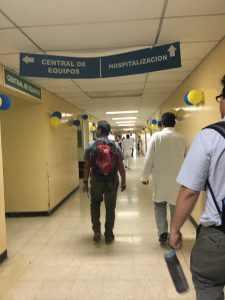Since returning late Sunday morning (due to weather-related issues), I had a lot of time to reflect on the past 2 weeks and all that occurred in addition to all that I learned while being in Nicaragua. I can’t help, but to have mixed emotions. I’m filled with gratitude for being able to experience such an amazing culture and motivation to take back what I learned from the NGOs and institutions we visited to the United States and be the change I want to see in the world. I am filled with hurt and disgust at what the United States was involved in which affected the Nicaraguan people gravely.
It is hard to go to a “3rd world” country to learn from the people and their history, when the people have nothing, but negative things to say about the horrific history the two countries share. Even with the negative history that the US shares with Nicaragua, the people welcomes us with open arms. They were delighted to discuss their history and the current issues that they face. We shared ideas, viewpoints, hugs, pictures, and history. Through these things we were able to learn from one another on the same ground level and that was an amazing experience. I am more humble and appreciative of the freedoms we have in the US since returning home.
Over the last 2 weeks we visited Managua, Leon, Massaya, Granada, and Matagalpa. Visiting all 4 Departments in Nicaragua, not only gave us different perspectives of the Nicaraguan history as well as current social issues, but it also gave us a sense of community and culture. It was a phenomenal feeling to be apart of such an amazing and deep culture. I felt the pain, the sadness, the happiness, the motivation and the pride in their voices when they told their stories. I felt the dedication that they had to their particular cause and the community they were serving.
One thing that was common in the organizations we visited is that they have NEVER received government funding from the current administration which has been in power for about the last 15 years. This saddened me, but surprised me at the same time. ALL of the organizations and institutions we visited were doing amazing work and for them to not have any government funding is mind boggling to me. Not only did that impress me, but it also motivated me to learn how they do it, and take that information back to the non-profits I work with and implement that. There is something amazing about the fight and drive that people in “3rd world” countries have. This is certainly something that all “1st world” countries can learn from.
As you can tell this was a very educational, inspirational and amazing study abroad trip to Nicaragua, Central America. Even through some difficulties along the way, I am humbled by the experience and all of the Nicaraguan and Central America people I crossed paths with.
Lastly, thank you to Ausburg College and Center for Global Education and Experience (CGEE) for awarding me the Mary Witt Scholarship. Without that scholarship, this trip would not have happened for me. Thank you so very much!
-Amanda






























